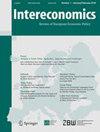当前的审慎框架能否应对气候风险的挑战?
Q1 Economics, Econometrics and Finance
引用次数: 1
摘要
随着气候和环境问题变得越来越普遍和切实,它们可能会影响金融体系的稳定性。因此,适当的金融监管和监督措施必须到位。本文讨论了由于气候和环境风险的具体化以及当前审慎框架的缺点,金融机构和金融体系所面临的挑战。提出的论点表明,如果《巴黎协定》规定的转型的根本目标是逐步淘汰燃煤能源,减少石油和天然气的使用,并转变碳密集型企业,那么改善银行治理监管和/或促进与气候相关的信息披露要求可能还不够。相反,充分考虑气候风险的资本要求发挥了关键作用。此外,由于微观审慎工具通常侧重于直接风险敞口,它们可能不足以解决气候风险的系统性问题。因此,宏观审慎措施不应被忽视。本文章由计算机程序翻译,如有差异,请以英文原文为准。
Are Current Prudential Frameworks Up to the Challenge of Climate Risks?
Abstract Climate and environmental issues will likely impact the financial system’s stability as they become more pervasive and tangible. As a result, the appropriate financial regulatory and supervisory measures must be in place. This article discusses the challenges faced by financial institutions and the financial system due to the materialisation of climate and environmental risks and the shortcomings in current prudential frameworks. The arguments presented suggest that if the fundamental goal of the Paris Agreement-aligned transition is to phase out coal-fired energy, reduce oil and gas use, and transform carbon-intensive businesses, improving bank governance supervision and/or fostering climate-related disclosure requirements may not be enough. A critical role is instead played by capital requirements that adequately consider climate risks. Moreover, since microprudential tools are typically focused on direct exposures, they may not be sufficient to address the systemic dimension of climate risks. Macroprudential measures should therefore not be overlooked.
求助全文
通过发布文献求助,成功后即可免费获取论文全文。
去求助
来源期刊

Intereconomics
Economics, Econometrics and Finance-Economics, Econometrics and Finance (miscellaneous)
CiteScore
5.00
自引率
0.00%
发文量
66
审稿时长
16 weeks
期刊介绍:
Intereconomics publishes papers dealing with economic and social policy issues in Europe respectively in Euroland. The journal consists of the sections editorial, forum and articles. The editorial section contains brief comments on current questions of economic policy in Europe or effecting Europe. In the forum, several authors (researchers, politicians, representatives of trade unions and of employers associations etc.) voice their opinions on one particular current economic policy problem effecting Europe. The articles deal with economic policy issues and trends in Europe. They are mostly written by researchers in economics. Officially cited as: Intereconomics
 求助内容:
求助内容: 应助结果提醒方式:
应助结果提醒方式:


